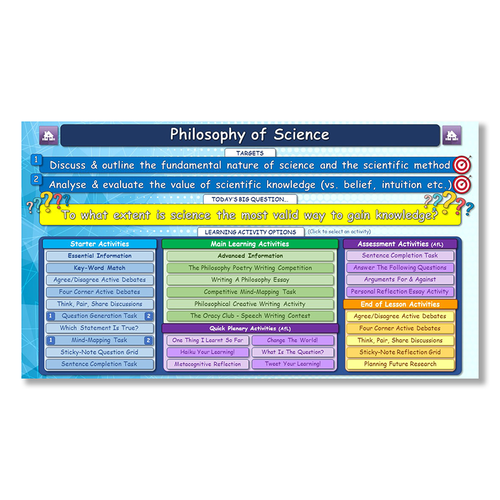
















This multi-use interactive philosophy lesson explores ‘Philosophy of Science’: the branch of philosophy that’s concerned with the nature, foundations, methods, and implications of science. The central questions of this study concern what qualifies as science, the reliability of scientific theories, and the ultimate purpose of science.
This session is ideal for teachers who want to explore philosophy of science with students aged 8-16; we’ve carefully selected the most significant issues and questions relating to philosophy of science so that young learners can engage in fun philosophical discussions and debates. This session explores topics such as:
- The nature of science
- The ways in which scientists pursue knowledge
- Strengths and weaknesses of the scientific method
- The nature of pseudoscience and how to identify it
It outlines and explores different concepts from philosophers of science including empiricism and naturalism as well as the views of Aristotle, Bacon, Descartes, Duhem, Feyerabend and Cartwright (in the advanced reading section).
The big question asked in this session is “To what extent is science the most valid way to gain knowledge?”. Using a variety of engaging activities students will discuss and debate a wide range of other philosophical questions such as
- What is science?
- What is the difference between ‘scientific knowledge claims’ and other types of knowledge claim?
- How can we tell the difference between pseudoscience and actual science?
- To what extent is the materialist view (that only physical matter exists) accurate?
- What are the strengths and weaknesses of the scientific method of pursuing knowledge?
This session uses our unique format for philosophy teaching resources and features an integrated menu that allows teachers to select from a variety of starter, main, plenary, assessment and end-of-lesson reflection activities. With a massive selection of activities designed to trigger philosophical discussions, debates and reflections: you can re-use the resource numerous times with the same group.
This resource is especially suitable for teachers of science who are looking to explore the nature of science and the scientific method more deeply with students and bring philosophy, philosophical thinking and critical thinking into their science lessons.
The file is a PowerPoint Show: no planning or preparation is required, just run the file and the intuitive menu system will make delivering a powerful philosophy session very easy! This resource is suitable for students aged 8-16; due to the flexible nature of the sessions design it can be used for multiple hour-long sessions or as a short stimulating tutor-group activity.
Something went wrong, please try again later.
This resource hasn't been reviewed yet
To ensure quality for our reviews, only customers who have purchased this resource can review it
Report this resourceto let us know if it violates our terms and conditions.
Our customer service team will review your report and will be in touch.